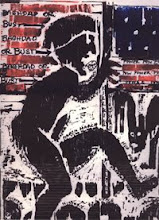A year after Israel's bombardment of Gaza, a year after we marched and held vigil outside the UK Israeli Embassy, I followed the progress of Viva Palestina anxiously until under George Gallowway's astute and unstoppable leadership it got into Gaza.
Meanwhile in Cairo Mubarak tried and failed to stop many brave people from around the world (people like my Brighton friend poet Naomi Foyle) from demonstrating against its refusal to allow them into beseiged Gaza, and to protest also its present sinister work at Israel's behest to sink metal walls underground along the Gaza/Egyptian border, thus cutting the supply tunnels the sick and undernourished Gazans have mainly relied on for the past 2 and half years.
Meanwhile back home I thought my contempt for our own government's foreign policy (which follows a Mubarak poodle policy that Cameron if he wins the election will follow too, sure as mud) had sunk along with Brown and co into the mud pretty much as low as contempt can sink.
But then yesterday I listened to Goldsmith, Blair's Attorney General, at last explain his reasons publicly for saying it was legal to invade Iraq in 2003; it makes me wonder in the face of such arrogantly blatant bad argument why mud, or worse, never seems to stick where it should.
Iraq and Afghanistan has suffered, are suffering, and in the last century the third, or chronologically first, victim of Western rapacity has long been Palestine.
I agree with those who say only ordinary people now can achieve the liberation of the Palestinians, not our muddied rulers. (Oh but why not? Read below just for the business reasons.)
As ideological raincoats our rulers do homage to a distorted 'ethnos' picture of the Jewish people (nothing to do with the murdering Hitler, it turns in fact on a tragic but mythic diaspora invented and racheted up by militant Zionists in the last 1o0ish years).
As you can tell I and my husband (who is Jewish) have been reading through a israeli historian's book out last year, The Invention of the Jewish People. Historiography, slow in places no doubt, but here is a vital summary of what real history has to tell and will I hope most of all tell to the young hopefully more rational modern Israelis about what really happened to the Jews, (and to the Judean people), in the 1st and 2nd centuries CE.
Does so long ago matter? Well, yes, according to Jabotinsky, but read and see.
Meanwhile, until false ideology can be replaced with the true - and much more interesting and vivid and proud history of Judaism and the Jews in old Russia and Eastern Europe - us ordinary people, Jewish and non-Jewish, the world over, led by leading rationalist and humanist Jews, choose to stand by the 'victims of victims' as some Palestinians say.
A bit of a speech I realise - oops! - but it leads to the following, which I hope you'll have a moment to read. A friend emailed it to me today as part of the global Boycott, Divestment, Sanctions Campaign.
For us UK shoppers, here following (wouldn't you agree) is one of the best short short summaries of why not to buy your Israeli fruit and veg and packeted herbs from Tesco - Though so sad now to see hardly a UK town without our own musclebound Tesco, our own super wealthy support of Middle East land theft!
Encl: via Omar Barghouti, Israel
Students Against Israeli Apartheid
For the past several months Carleton (SAIA), a student group at Carleton University in Ottawa that is committed to supporting the Palestinian struggle for freedom, has been conducting research on Carleton’s investments in Israeli apartheid. The Carleton Pension Fund currently lacks any ethical guidelines, with its only mandate being the maximization of profit. SAIA has discovered that the Pension Fund, which provides retirement income for Carleton staff and faculty, currently has some $2,762,535 invested in five companies that are complicit in the oppression of the Palestinian people. In light of these findings, SAIA has launched a campaign calling on Carleton to immediately divest from the offending corporations: Motorola, BAE Systems, Northrop Grumman, L-3 Communications, and Tesco supermarkets, as well as to adopt a socially responsible investment policy for all of its investments.
Motorola is involved in designing and implementing perimeter surveillance systems around illegal Israeli settlements and military camps in the West Bank. Motorola and its subsidiaries also have hundreds of millions of dollars worth of contracts to supply the Israeli military with telecommunications technology, checkpoint security and control systems. By providing support for the Israeli military, Motorola plays a role in ensuring that settlement expansion will continue, and that the occupation will deepen, in a clear violation of international law.
BAE Systems is the world’s third-largest arms producer. Both BAE and its Israeli subsidiary, Rokar, contribute to weaponry used by Israel to attack Palestinian civilians in the occupied West Bank and Gaza. BAE produces cluster bombs and the F-16 combat aircraft, which were used during the 2008-2009 assault on the Gaza Strip, which killed over 1,400 Palestinians, most of whom were non-combatant civilians.
Northrop Grumman, one of the world’s largest weapon’s manufacturers, provided the Israeli military with many of the parts for the Apache AH64D Longbow Helicopter, which was described by Amnesty International as a piece of “key equipment used by the [Israeli military] in the [December 2008 – January 2009] Gaza bombing campaign.” Furthermore, Northrop Grumman is the sole provider of radars for the F-16 combat aircraft. It also assists in producing the Longbow Hellfire 2 missiles, which, as has been documented by many human rights organizations, were widely used against Palestinian civilians in Gaza.
L-3 Communications is one of the many large multinational firms aiding in the construction and maintenance of the system of military checkpoints that severely restrict Palestinian freedom of movement in the West Bank and around Gaza. The matrix of checkpoints has been condemned by human rights organizations as a brutally repressive system that violates the basic human rights of the Palestinian people. In addition to being a means of political repression and land annexation, the checkpoints constitute a tool of collective punishment, which is a crime under international law.
Tesco Supermarkets is a large United Kingdom-based international grocery and general merchandising retail chain. It has been the target of social justice activists in the U.K. for selling produce originating from illegal Israeli settlements, for mislabeling products coming from the settlements as “West Bank”, as well as for using an exporter, Carmel-Agrexco, which has been criticized for using slavery-type working conditions in its factories in the occupied West Bank. Tesco’s financial support for the illegal Israeli settlements lends them legitimacy and enables their economic growth and physical expansion, while simultaneously inhibiting the development of the Palestinian economy.
Carleton is no stranger to BDS activism, and it has a strong precedent to build upon. In 1987, Carleton divested from all companies complicit in the apartheid regime in South Africa. Carleton’s president at the time wrote a memorandum, saying, “Carleton University abhors apartheid and will do all it can to show its position on apartheid within its business practices.” Given Carleton’s past commitment to divesting from apartheid regimes, SAIA is calling on the university to once again place itself on the right side of history by ending its investments in the ongoing oppression of the Palestinian people.
The South African victory serves as an inspiring model for SAIA's divestment campaign, which is the first Palestine-centred divestment initiative in Canada. Hopes are high that, through a well-planned local campaign, as well as the natural growth of BDS, momentum will pick up at universities across the country and similar initiatives will emerge to form a national movement to cut campus ties with Israeli apartheid.
Specifically, SAIA recommends that:
1. The Carleton University Board of Governors, via the Pension Fund Committee, immediately divest of its stock in BAE Systems, L-3 Communications, Motorola, Northrop Grumman, and Tesco
2. Carleton University refrain from investing in other companies involved in violations of international law (for recommended guidelines see Conclusions/Recommendations section of the divestment report)
3. Carleton University work with the entire university community to develop, adopt, and implement a broader policy of Socially Responsible Investment (SRI) for its Pension Fund and other investments, through a transparent and effective process.
LINK TO DIVESTMENT DOCUMENT: see links
Thursday, 28 January 2010
Subscribe to:
Post Comments (Atom)









No comments:
Post a Comment